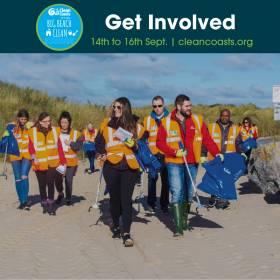Displaying items by tag: Clean Coast's
63 Tonnes of Marine Litter Removed in Ireland for the Big Beach Clean
Clean Coasts received overwhelming support and commitment from volunteers and communities across Ireland for the Big Beach Clean weekend that took place between 16th and 18th September.
This year, a record number of over 500 clean-ups were organised by volunteers who removed over 63 tonnes of litter nationwide.
Clean Coasts also joined forces with Irish business Cully and Sully, who supported the initiative again this year, and one of their registered group Clean Coasts Ballynamona, to host a flagship event at Ardnahinch, Co. Cork. Clean Coasts officers also attended beach cleans in several locations around Ireland.
The Big Beach Clean is an annual call to action that runs as part of the International Coastal Cleanup (ICC), operated internationally by Ocean Conservancy and invites communities and volunteers around the country to remove litter from around the Irish coast after the end of the bathing season.
 Big Beach Clean in Greystones, County Wicklow
Big Beach Clean in Greystones, County Wicklow
Once more, volunteers were asked to join the call to action, no matter how far from the coast. Statistics show that the number one cause of marine litter is litter dropped in towns and cities and getting involved in the Big Beach Clean has been a way for residents of non-coastal counties to help prevent litter entering our waterways tackle the problem at its source.
Each year this initiative is also an opportunity for Big Beach Clean volunteers to get involved in a worldwide citizen science project, which entails collecting the amount and types of litter on Irish beaches and filling in Clean Coasts’ Marine Litter Data Cards to share with Ocean Conservancy, help heighten awareness about the issue of marine litter serving as an indicator of the magnitude of the problem and help shape future policies and campaigns.
 Volunteers cleaning the beaches of Dungarvan
Volunteers cleaning the beaches of Dungarvan
So far, data collected from the International Coastal Cleanup have informed policy in a number of areas, leading to laws banning the use of plastic grocery bags; prohibiting smoking-related litter; encouraging the use of reusable bags; prohibiting mass balloon releases; and prohibiting foam food and beverage takeaway containers.
For the third year, Cully and Sully joined Clean Coasts as sponsors of this call-to-action. Cullen Allen (Cully) said, “We were delighted with yet another amazing Big Beach Clean weekend. The Clean Coasts staff and volunteers were fantastic across the weekend, although we know many are out every weekend of the year.. not just Big Beach Clean weekend.. so Thank You all. This is one of our favourite initiatives across the year and it was so heartwarming to see the great turn out yet again for 2022.”
Clean Coasts and Cully and Sully have also teamed up to create some resources to help people educate themselves on which household items are recyclable, which ones aren't and how to correctly dispose of rubbish in your home as well as rubbish found on the beach. If you’re curious about recycling basics, common beach finds and how to dispose of them, what happens to our waste, stats on recycling in Ireland and more, head to recycling webpage at: https://cleancoasts.org/how-to-recycle/
Clean Coasts 'Big Beach Clean' Begins Tomorrow And Weekend of 15th-16th September
#MarineWildlife - Clean Coasts 'Big Beach Clean' returns to Ireland in 2018 beginning tomorrow, with the volunteer effort continuing throughout this weekend of 15th-16th September.
So join in and take positive action by raising awareness of the massive damage caused by marine litter pollution on the natural world. This can be done by registering online as a Clean Coast group or why not organise your own event with family and friends.
Once again Clean Coasts, An Taisce's Environmental Education Unit, is teaming up with the Ocean Conservancy for the International Coastal Cleanup event.
Clean Coasts in 2018 is to continue the growth and success of last year's Big Beach Clean, by increasing the number of beach cleans along the Irish coastline. In addition it is their aim to increase the amount of marine litter data collection.
As with previous years, Clean Coasts beach clean packs will contain marine litter data collection cards. This year they will also be encouraging their groups to use the Clean Swell App by Ocean Conservancy and will add a marine data portal to the Clean Coasts website. This will make it easier for volunteers to submit data collected on the beach cleans.
According to Clean Coasts, last year the international event involved 789,138 volunteers taking part from more than 100 countries. Collectively they accumulated nearly 20.5 million pounds (or 9.3 million kilograms) of marine litter.
As in previous years, among the principle litter culprits, cigarette butts—which contain plastic filters—topped the list at approximately 2.4 million collected. This category was followed by food wrappers (1.7 million), plastic beverage bottles (1.6 million), plastic bottle caps (1.1 million), and plastic grocery bags (757,523) rounding out the top five.
Clean Coast encourages everyone to enjoy being part of the movement for litter free seas in addition to being part of the world’s largest coastal cleanup event. Also for those participating in the marine litter survey.
For further information on Clean Coast, the Big Beach Clean and much more visit their website here.
























































